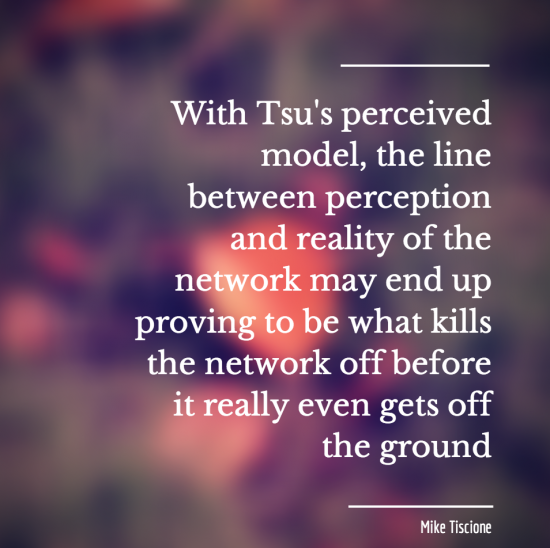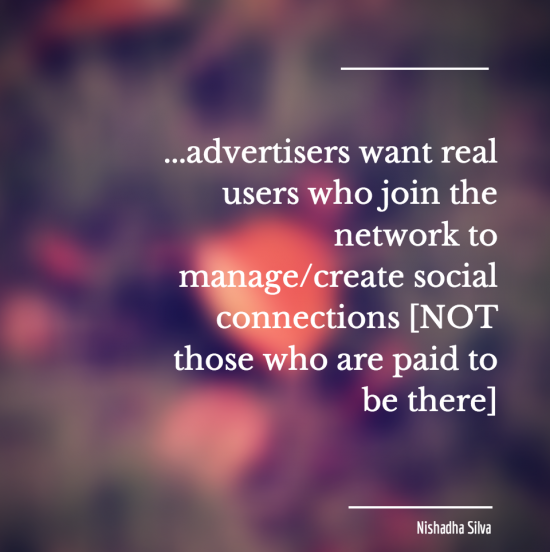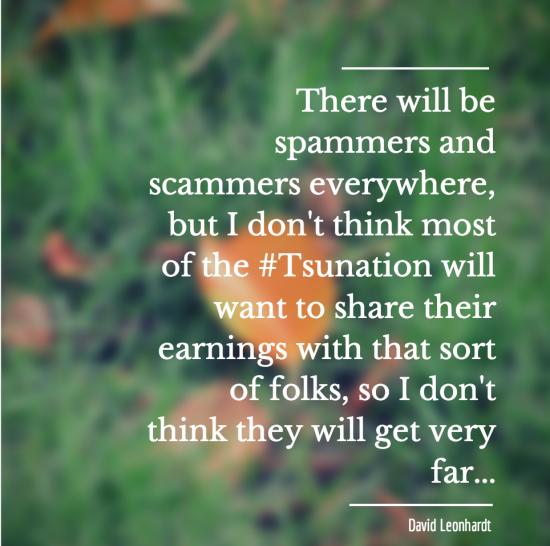With the new neat social media network on the rise, I went ahead and asked my fellow MBU users what they think of its future. I was inspired by this article and given the (well-grounded) negativity in it, no wonder the discussion was geared against the startup.
Now, I don’t really want to be ONLY negative here. TSU is already under hackers and abusers’ attack but they are working hard to solve the problem! I want to point out straight away that I see TSU founders as genuine and hard-working people – which is why TSU is not just another money scam we’ve seen before. We see a great innovative idea here and leading innovation is hard, so don’t expect there will be no errors or scandals at the beginning.
Now let’s see what others think:
 Daniel Andrei Garcia
Daniel Andrei Garcia
Eli raised a lot of hyfaluting points many of which are indicative of his strong beliefs regarding the concept of “friendship” and “social networks”.
If we go back to the stone ages, friendship was most likely a mechanism to preserve the small tribe. Humans banded with others because they know that they could not survive on their own against the elements, wild animals and enemies. In a way this relationship has what we now call the element of “friendship with benefits”. They shared in the hunt while others kept the home dwellings. In return for this cooperation, food and dwelling was shared. Mutual survival guaranteed. Companionship was a bonus.
Now, fast forward to today and we have complex relationships between corporations, individuals, communities and other formalized entities such as governments and its agencies. It’s much different now but “friendship” in a way is still the same. People often leave when it’s no longer mutually beneficial.
Why and how do people choose their friends? Companionship is one, but companionship with different interests is not that beneficial. So the strongest friendships that last longer are those that are based on the mutual desire to achieve something. It may sound “heartless” or even “callous” but if you think about it – friends often drift apart when they’re drawn to different values or interests. The relationship is further strained because of geography, among many other things.
Of course this does not hold true for all kinds of relationships.
The model for social media users to earn
This is very hard to prove so most of what I’m going to say will be based on opinion. How does social media make its money? Through advertisements paid by advertisers which ultimately lead to a solid tangible product. I know that many products nowadays are intangible such as software or intellectual property, but if you go further down the line, you’ll realize that it all still leads to some thing – a physical object of subjective and perceived value.
For example, a company may sell SEO software, such as SEM Rush. To sell it, they must prove themselves to be experts in their field. They must prove their relevance by showing how their system works. They blog, tweet make a FB post whenever something related to their niche comes up. They must demonstrate that their tools work.
Next up, think about who would use SEM Rush. These are mostly webdesigners, seo practitioners, writers or bloggers who package their services along with SEO tools.
The webdesigner designs a website for a restaurant who wants to have more paying customers who will patronize their business. Whether the restaurant gets more business or not, the webdesigner gets paid. In turn, the webdesigner purchases additional tools to keep his business on the cutting edge.
However, if the restaurant does not sell, he might choose another webdesigner, outsource or else stop maintaining his website at all.
Social networking is about the amplification of the emotional reaction to a product or a service about its perceived value. But the thing is, we already have too many tools at our disposal. The idea is very appealing if it becomes successful however, I have seen many who tried the same route and failed. One even offered the option to provide stock options in the network. They had to market it really hard and it was so obvious that eventually, the entity just dissipated.
One such example is Zurker. The site is offline now.
Search about Zurker and you will find a ton of controversy, disagreements and just overall bad things about it. But the thing is, it’s gone.
My final answer is – yes
But it’s not going to be based on a social network that promises members money just by using it. Here, Eli is right. That community will only be focused on that activity alone. If they don’t get the perceived benefits any more, they will leave.
But, and this is a big but. Networking and building relationships can bring about amazing things. How? Who knows? It depends on the group, their values and how they mesh and blend together. Take for instance, Christian communities in physical neighborhoods. Why do they thrive? Why do they still exist despite everything? Because the gain is not in this world. The benefit is not in this world – even though most of the time, the gain can be made possible in this world. Christians aspire for the practices and teaching in the Christian bible. Of course, there are many interpretations, but still, the basics are common. Now once you put that group together, they undergo several challenges and trials – this is where their character gets built. The longer they stick together, the stronger their group becomes.
Still, they are people with physical needs. So an opportunity comes up, and they introduce one another to another’s network. Trust, faith and the belief in the same value – ensures the proper flow of the transaction. A little is left for the group’s maintenance and other projects. And that’s it.
Tsu is an interesting experiment, but I fear that it could lead to the same fate as Zurker. Time will tell.
Mike Tiscione
Tsu is certainly onto something innovative, but will it really work?
With Tsu’s perceived model, the line between perception and reality of the network may end up proving to be what kills the network off before it really even gets off the ground.
Users will be intrigued by the network at the fact that you can make money off of it, but if it takes them a great deal of time and they’re really not making a whole lot, will they stick around?
Users will take a look at it because of how unique it is, but will this type of model be enough for them to pack up from Facebook and move? It’s tough to tell right now. It’s interesting though, I’ll give Tsu that.
 Philip Turner
Philip Turner
I joined yesterday, not out of any expectation to earn but to try to simplify my SM accounts.
The only people likely to earn anything are those who have thousands of referrals.
I have zero faith in anything that is so reticent about publishing how you earn as a formula, which I might have missed in my few minutes on the site, admittedly.
 Jeevan Jacob John
Jeevan Jacob John
Sites like Sponsoredtweets come to mind (I have earned a few bucks through them). It’s never really much though (unless you have a large follower base).
However if you pay people to be social, you eliminate their instrinsic motivation to be active on SM (extrinsic motives are almost always less effective and persuasive an instrinsic motivation).
Take blogging itself. If you started blogging just for earning money, chances are you will quit pretty soon (as it happens with many new folks).
But, if you start out with an instrinsic motive – a way to help others, or educate others (you can also develop an intrinsic motive over time; becoming passionate about your blog and its readers). It is possible to maintain both an instrinsic and extrinsic motive at the same time.
Take youtube gamers for instance. They are passionate about what they play, but they also want to make money (Affiliate marketing, advertising and selling their own products).
As for paid social media opportunities. Sure, a lot of people will jump on board, but success over the long term will be much harder (people will give up when they don’t make enough money; they might even end up hating social media for it).
I hope it doesn’t come to that. It’s best to leave social media as an beneficial activity with an instrinsic motivation – social media is communication. Paying people to just interact with others isn’t going to work well (changes the way we view communication).
(Of course, there are people who get paid to talk, but that’s different. I am just referring to normal conversations).
 Nishadha Silva
Nishadha Silva
To share revenue with users you need to have advertisers.
And advertisers want real users who join the network to manage/create social connections.
When you start paying for something like that you attract users who are there for the money and not for any meaningful social interaction.
So it will be hard to find advertisers for it and eventually die down. I think it will give a decent return for the early users but eventually die down.
 Al Remetch
Al Remetch
In all probability, tsu is not only sustainable but poised to be huge. Look at the facts from another perspective. Of course it is sustainable. Tsu makes money by advertising. Using easy numbers, let’s say they make 100 per day.
As we know that money is divided up into two pots. One for content and one for mlm.
If the amount is more than 100, than the royalties are more. If it is less, the royalties are less.
The house (tsu) doesn’t go in the red.
As a result they don’t run out of cash.
They have the money to sustain their operation.
Nobody expects to get rich off of this. But the users do see their bank accounts growing by a dollar or so a day, some much more, some a little less. They like it, the site gets traction. They like collecting royalties for doing what they already do for fun on other social network.
The royalties are a similar motivator like G+ dangling search results benefits when it launched. People came to G+ in hordes to improve their rankings. One famous plusser said he came here for the search effect and stayed for the conversation.
The same thing will happen at tsu. They will come for the pennies and stay for the social network. Some people will actually make big bucks and when word gets out it will spread like wild fire andthat will attract even more people to tsu.
The advertisers will love it, because they won’t care how the people got there. There are just happy to have millions of people seeing their ads.
Because there is not a dollar cost of entry, and currency is based on a solid business model of simple advertising just like AdWords and AdSense, this mlm (and it really isn’t a mlm) does not constantly require new sign ups to survive. It is sustainable. It only requires content and eyeballs, just like Facebook and just like G+.
TSU is not doomed. But poised to be huge
 Jason Darrell
Jason Darrell
Why is everyone focusing on the money aspect? Why not treat #tsu like any other start-up social network?
Decide how much time you want to spend on it, be aware of the content you’re posting and then work out the value in the friends you make. Just like you do here, Twitter, Facebook, wherever.
It’s utterly impossible at this stage to know who we’re going to meet down the line.
Any one of us may meet the most inspirational and influential person we’ve ever done. Who can say at this stage?
What I can say with confidence is that with so much negativity floating about from those not giving it a chance, it’s like they’ve taken an air-rifle to a barrel of stickleback and are hogging the rim before anyone else can take a peep to see what’s inside.
Look, forget about the money for a minute and tsu is no different from any other start-up network we’ve seen.
Well, apart from the fact that the moderators/support are real people who get back to you in (almost) real time. Absolutely superb.
A problem will arise if people keep posting about the money, about the money, about the money.
Let’s see a constructive post about relationships, interactions, UX – what are our connections sharing there? Not too much to ask, is it?
 David Leonhardt
David Leonhardt
The article is spot on about false motivation through monetary gain. Smart users are noting that this is not a way to get rich, but that it’s better to earn a little money than none at all. Many people are already Tsuting about the need to only post, like and share quality content. Current users are banding up against the oncoming rush of spam. And Tsu has already added to their TOS that there can be no chain sharing (“share this to get more money”) posts.
The people who will actually make the most money will be those people who A) attract a strong base in their tree, which is something I am serious about, and B) keep sharing quality content that is highly useful or entertaining, which is what I really enjoy doing.
There will be spammers and scammers everywhere, but I don’t think most of the #Tsunation will want to share their earnings with that sort of folks, so I don’t think they will get very far. And after the early adapters, I suspect that #Tsunation will increasingly be composed of just regular people who don’t pay too much attention to the money.
The other question that article raises, about whether people will be discouraged if they don’t make enough money, might well come to pass. Smart people, as I said, won’t be focused on that; but many people won’t be smart about this. But, it does help to remember that even $10 a month on Tsu is more than $0 a month elsewhere, so if social is part of your fun or business, you are still ahead of the game with Tsu.
What are your thoughts?
- How To Build Traffic Without Relying On Google Rankings - July 4, 2025
- Why I Blog, and Why You (and Your Business) Should Too - September 27, 2024
- How To Promote Your Ebook On Twitter - May 30, 2024
- How to Print Your Social Media Memories - March 7, 2024
- How to Boost Sales with Social Media - August 1, 2023
- 5 Community Building WordPress Plugins - May 16, 2022
- 5 SEO Tips For Blogging And Content Creation - February 21, 2022
- Facebook Video Ads and Your Small Business: 6 Tips to Help You Win New Audiences - November 1, 2021

Some very good points Anna, especially regarding those who may join just for the possible earnings. I suppose the ideal situation would be that those who are genuinely interested in what social media offers will naturally filter from those who aren’t…Well, maybe.
According to my (very short) experience in Tsu, the people attracted just by easy money clearly outnumber those interested in the social interaction. Hopefully the trend can reverse because, as you mention, this is the only way to make it sustainable in the long term.